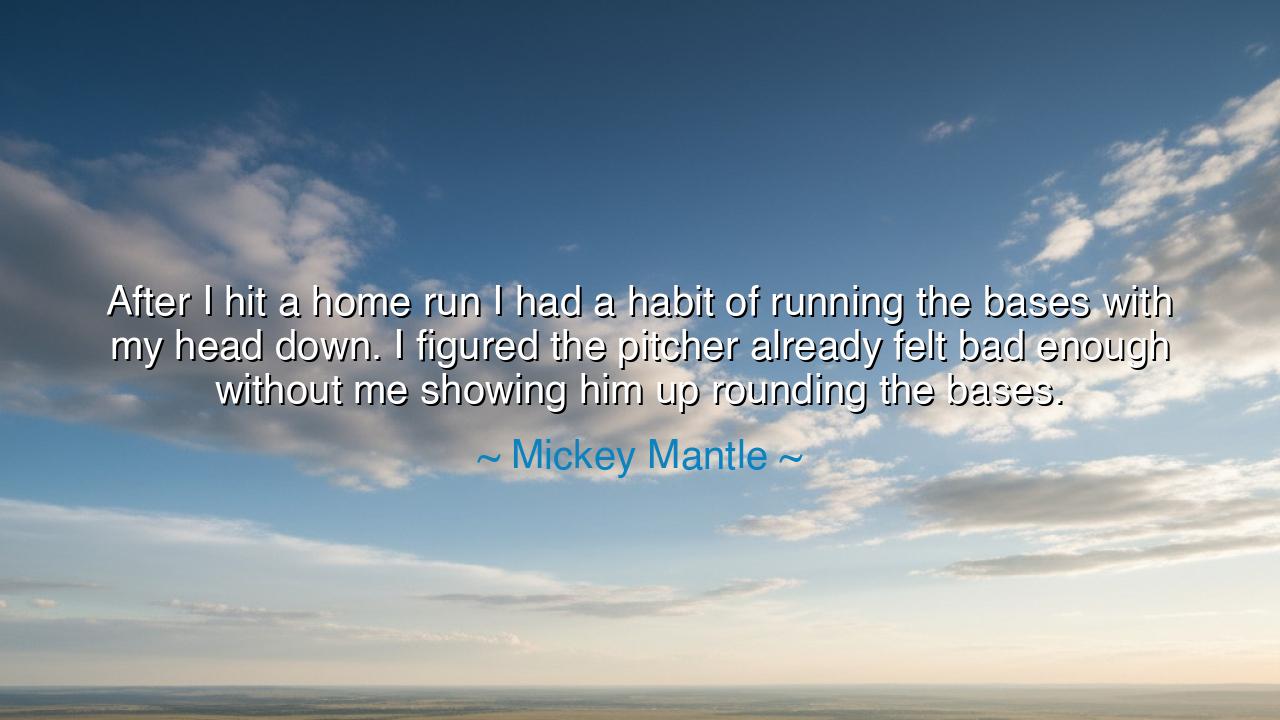
After I hit a home run I had a habit of running the bases with my
After I hit a home run I had a habit of running the bases with my head down. I figured the pitcher already felt bad enough without me showing him up rounding the bases.






The words of Mickey Mantle, when he said, “After I hit a home run I had a habit of running the bases with my head down. I figured the pitcher already felt bad enough without me showing him up rounding the bases,” reveal the rare grace of a man who, though a giant in triumph, understood the weight of humility. In this simple reflection, Mantle — one of baseball’s most celebrated heroes — shows us that true greatness does not shine only in victory, but in compassion toward the defeated. His words are not only about the game of baseball; they speak of the eternal game of life, where the measure of a person lies not in how they win, but in how they honor those who have lost.
To understand the heart behind this quote, one must remember who Mantle was — a legend whose power at the plate and speed on the field made him a living myth. Yet despite his gifts, Mantle carried the quiet wisdom of one who had known both triumph and pain. When he speaks of keeping his head down, he speaks not of shame, but of respect — an unspoken code of sportsmanship that echoes the chivalric traditions of old. Like the ancient warriors who saluted fallen foes, Mantle understood that victory without dignity is hollow, and that arrogance diminishes both the victor and the game itself.
This attitude recalls the spirit of the ancient Greeks, who believed that hubris — the pride that mocks others — is the beginning of downfall. The gods, they said, punished those who triumphed without humility, for it is not strength alone but restraint that marks the truly noble. Mantle’s quiet rounding of the bases mirrors this ancient wisdom: that self-restraint is the crown of mastery. To celebrate without cruelty, to honor the struggle of one’s opponent — this is what separates the hero from the braggart.
Consider the story of Abraham Lincoln, who, after the Civil War, refused to treat the defeated South with vengeance. “With malice toward none, with charity for all,” he said, as he sought not to humiliate his enemies, but to heal a nation. Like Mantle, Lincoln understood that grace in victory is the highest form of power — for it conquers not only opponents, but bitterness itself. Both men knew that respect for the fallen honors the struggle that binds all who strive, whether in war or in play.
In Mantle’s world, the baseball diamond was more than a field — it was a mirror of life’s truths. Every pitcher who faced him carried his own hopes, his own fears. To crush another’s spirit for the sake of applause would have been easy; to hold back, to walk humbly in triumph, was the act of a man who understood empathy. His gesture — that simple act of running the bases with his head down — was a silent sermon on sportsmanship, kindness, and respect. It said to the world: even in victory, remember your shared humanity.
The lesson is as clear as it is timeless. When success visits you, wear it lightly. Do not raise your head too high, lest pride blinds you to the dignity of others. In every victory, there lies a duty — to honor those who strove beside you, even those who fell. The one who wins with humility wins twice: once in achievement, and once in character. Mantle’s wisdom teaches us that kindness in power is the truest strength — and that compassion, even toward the defeated, elevates the soul beyond all trophies.
So, to those who rise — in sport, in work, in life — remember the lesson of Mickey Mantle. When your moment of triumph comes, keep your head bowed, not in shame, but in reverence. Do not flaunt your success before those who tried and failed. For one day, the cycle will turn, and you too will stand where they stood. And if you can meet both victory and defeat with grace, then, like Mantle, you will have achieved not only greatness in the world’s eyes, but honor in the eyes of eternity.






AAdministratorAdministrator
Welcome, honored guests. Please leave a comment, we will respond soon